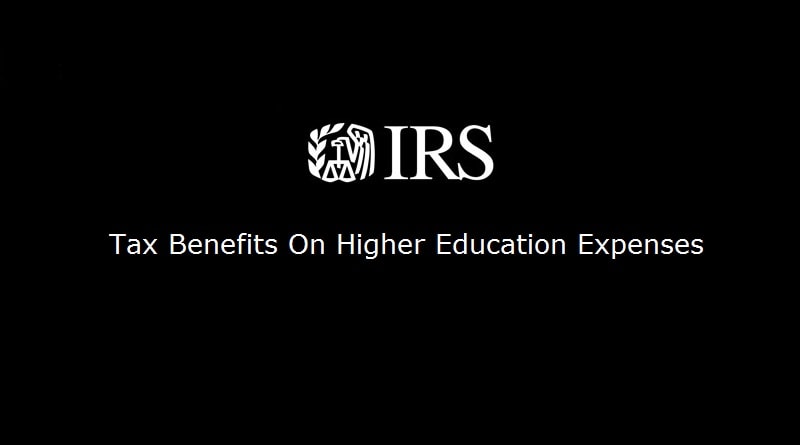AOTC & LLC – Two Higher Education Tax Benefits For US Taxpayers
No doubt, college and higher education in the US are expensive for sure. In fact, non-affordability is one of the top reasons for many Americans to not pursue Higher Education. In 1990, America ranked first in 4-year degrees, today, it ranks 12th. More or less half of the high school graduates never opt for college education and there’s a very strong inverse relationship between the number of pupils enrolling in higher degree programs and the overall cost of tuition. In fact, much has been said and discussed on various forums about the education cost and the college attainment gap that’s widening year by year.
Anyways, did you know that besides the social benefits of gaining higher education, there are certain tax benefits as well that you can claim in your yearly tax returns?
Agreed, the college and higher education is expensive but you can also take advantage of tax benefits that come with these high expenses.
They’ve been there for years so I thought that why not educate you guys about it so that you don’t let your, your spouse’s or your children’s educational expenses go in vain.
Moreover, it’s not like you have to opt for an expensive 2 or 4-year course. You can look for short-term courses like aws training certifications that may also get you a few tax benefits.
In this article I will explain what are these tax benefits, differences between them, eligibility and how can you claim them on your tax return.
So shall we start?
The federal government provides two main tax benefits, in the form of tax credits. These are:
- American Opportunity Tax Credit (AOTC)
- Lifetime Learning Credit (LLC)
American Opportunity Tax Credit (AOTC)

Previously known as the Hope Scholarship Credit, AOTC is applicable for expenses incurred in the tax years from 2009-2017.
The credit applies to higher education expenses like certain tuition fee, course material purchase etc. and therefore, may include some expenses which are not directly paid to the eligible educational institutions.
You can claim benefits on 4 years of academic expenses and up to $2,500 of total expenses per year for yourself, spouse or your dependents.
Eligibility Criteria for AOTC
In order to claim AOTC, the taxpayer should meet the following criteria:
- Fees must be paid for enrollment and tuition in that particular tax year to an eligible post-secondary educational institute.
- Some expenses not paid to the eligible post-secondary educational institute can also be claimed under AOTC. This included the purchase of course materials and equipment say, computer. If a computer is purchased, it can only be claimed if owning a computer was a condition for enrollment and attendance.
- If the Modified Adjusted Gross Income (MAGI) is $80,000 or less if filing singly or $160,000 or less if filing jointly.
- Tax deduction has not been claimed against the tuition fee in the same tax year. You can either claim a tax deduction or AOTC on your tuition expenses. In most cases, the Tax Credit normally results in more tax savings as compared to tax deductions.
- The student enrolls in a program that leads to a post-secondary educational credential or a degree certificate.
- The student should not be convicted of a felony drug offense. Note that in some cases, students may be wrongly accused and harassed. This can potentially damage their reputation, which is why it is of paramount importance to consult with a criminal defense lawyer in Phoenix or wherever the student is charged with this kind of crime.
- The student is not an F-1 Visa Student.
How Much Is Tax Credit Available Under AOTC?
As mentioned above, you can claim up to $2,500 per tax year as your tax credit. That’s not it, out of this $2,500 you can claim up to 40% in refunds as well.
This means that if your tax liability is absolutely zero before applying the AOTC, you can request up to $1,000 ($2,500 x 40%) as your refund in that particular tax year.
How Can You Claim AOTC In Tax Return?
In order to claim AOTC, you may need to fill out form 1098-T first. The educational institutes provide this form however, in some exceptional cases, the requirement of this form is waived off. After filling the form, the institute retains one copy and hands over the another to the student which the student/taxpayer is required to file the submit to the IRS.

The purpose of 1098-T is to confirm the status and eligibility of the student. For e.g. if he’s a part-time student or a full-time graduate. Or in other words, the educational institute acknowledges the person as a student.
Second, you’d also need to fill out form 8863. This is the form where you will mention all your educational expenses.

Once filled, the total on line 19 of form 8863 will be transferred to line 50 in the taxpayer’s individual tax returns (1040 or line 33 in 1040A).

How to Get Banned From Claiming AOTC?

If you wrongfully claim AOTC in your tax return when you were not eligible to do so, you can get yourself banned for up to 10 years from claiming the credit.
So make sure you only claim AOTC when you’re absolutely sure that you meet all the criteria.
Lifetime Learning Credit (LLC)
Lifetime Learning Credit (LLC) is another tax credit provided by IRS.
Again, this applies to the higher education expenses incurred by the taxpayer for himself, his spouse, or any dependent.
How Much LLC is Allowed For Each Eligible Student?
LLC isn’t claimed on a “per student” basis but a “per year” basis. The total amount of credit claimable under this tax credit scheme is up to $2,000 per tax year. So if you’re claiming LLC for more than one eligible student, the total of that claim cannot exceed more than $2,000 in total.
However, you can claim Lifetime Learning Credit for all the years of post-secondary education as long as you’re incurring the expenses. So this credit applies to an unlimited number of years.
Eligibility for Lifetime Learning Credit (LLC)

All the eligibility criteria to claim LLC are the same as for the AOTC with some differences mentioned below. So this means that if you’re eligible for AOTC, you may also be eligible for LLC.
However, these two credits are mutually exclusive which means that you can either claim AOTC or LLC for each eligible student in a single tax year.
BUT…!
You can definitely claim AOTC for one student and LLC for other student in the same tax year.
The Modified Adjusted Gross Income (MAGI) of the taxpayer should not be higher than $65,000 if filing singly $131,000 if filing jointly.
One important leniency that LLC provides though is that a convicted drug felony does not render the student ineligible as opposed to AOTC that we discussed above.
Additionally, you cannot claim LLC if you’re filing your tax return as a married individual filing separately.
How to Claim Lifetime Learning Credit (LLC) on your Tax Return?
The process of claiming LLC is same as AOTC above.
You need to fill 1098-T first to intimate IRS (and of course, also let IRS cross-validate your status).
The educational institution will retain one copy of the form while handing over the other one to the student. So that he submits it to the IRS.
Then while filing your individual tax return (1040 or 1040A), you may also need to fill form 8863.
The total in line 19 of form 8863 will also depict in line 50 of form 1040. Or line 33 of 1040A.
Please refer to the images displayed under the section, “How Can You Claim AOTC in Tax Return” above to see how these forms are filled to claim LLC on your higher education expenses.
AOTC or LLC. Which One Is Better?

I’m afraid the answer to this question is not straightforward and varies from case to case. However, generally speaking, AOTC normally results in more tax savings as compared to LLC but again, AOTC is only available for 4 educational years while you can claim LLC for unlimited years if your academic education.
So instead of answering in specific terms that either AOTC is better or LLC, let me jot down the differences between these two credits so that you can decide for yourself which tax credit should you claim.
Although much has been discussed already I thought it would be much more convenient if I write down the differences separately.
So here they are:
Differences Between American Opportunity Tax Credit (AOTC) and Lifetime Learning Credit (LLC)
- AOTC is available up to $2,500 per EACH qualified student while LLC is only claimable up to $2,000 per tax return. Does not matter how many qualified students there are.
- You can claim AOTC for only 4 educational years while LLC is available for unlimited years as long as you’re incurring qualified higher education expenditure.
- The credit under AOTC is refundable while you cannot claim refunds on LLC. So even if your tax credit is greater than your tax liability, you cannot claim the difference as a refund when applying Lifetime Learning Credit (LLC).
- For AOTC, your Modified Adjusted Gross Income (MAGI) should be less than $80,000 if filing singly and $160,000 if filing jointly. For LLC, this limit is lowered to $65,000 and $131,000 when filing singly and jointly respectively.
- Student, who is a convicted drug felon cannot claim AOTC while he can take advantage of LLC.
- In addition to the tuition fee, the qualified expenses for AOTC are the payments made for books, supplies and equipment etc. not necessarily paid to the educational institute. However, for LLC, you need to pay to the educational institute to make those expenses claimable under LLC.
- A person who is a dependent on somebody else’s tax return can claim AOTC but cannot claim LLC.
- The student must be enrolled in undergraduate or graduate program to claim AOTC but when it comes to LLC, even if he enrolls for courses to improve his job skills, the expenses can be claimed in LLC.
Read How You Can Claim Tax Benefits On Job Hunting Expenses
Concluding Thoughts
The higher education credit that you can claim from Uncle Sam is a pretty diversified and in-depth topic. Additionally, being a topic of tax, it is subject to change and does not remain the same over the years.
In this article, I’ve discussed some salient features of both the American Opportunity Tax Credit (AOTC) and Lifetime Learning Credit (LLC). Although, it covers both credits from a general perspective but it’s quite possible that based on your specific background, you may not be able to claim either of them as explained in this article.
Similarly, there must be tons of questions that you may have right now in your mind. Especially after reading this article.
So if that’s the case, I’d recommend you to visit this page to keep up with the latest changes in these credits and make sure that you stay updated with any changes.
Additionally, this source also explains with case scenarios if you will be able to claim the tax benefits from any of these credits.
Moreover, the website also mentions those expenses which don’t qualify as claimable under the tax credits and those amounts as well which do not reduce overall claim benefits.
In case this article does not capture your scenario well, I’d definitely recommend you go through the above resource.





I absolutely love your blog and find many of your post’s to be just what I’m looking for. Do you offer guest writers to write content for you personally? I wouldn’t mind composing a post or elaborating on a number of the subjects you write about here. Again, awesome web site!|
Pingback: Complete Guide of Section 199A Qualified Business Income Deduction - The Usual Stuff
Pingback: New Meals & Entertainment Deductions Under Tax Cuts and Jobs Act - The Usual Stuff